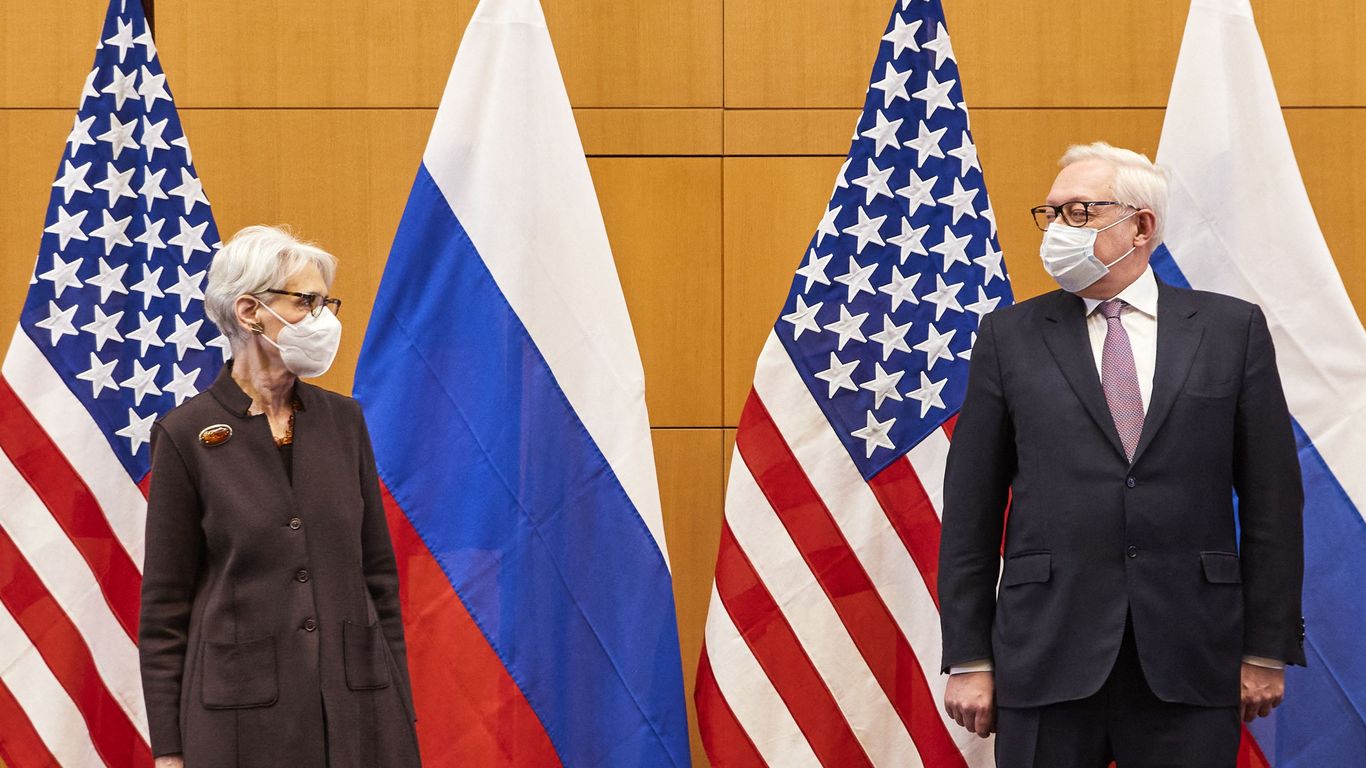
Top U.S. and Russian officials stuck to their red lines during nearly eight hours of security talks in Geneva on Monday, with the U.S. ruling out limits to NATO expansion and Russia warning that it would respond to a diplomatic failure with a "military-technical solution."
The big picture: The talks — which Deputy Secretary of State Wendy Sherman insisted were "not what we could call a negotiation" — kick off a week of urgent diplomacy intended to avert a Russian invasion of Ukraine.
- Neither side expects to make any decisions about the path forward until after two more rounds of talks later this week — the NATO-Russia Council on Wednesday and the Organization for Security and Cooperation in Europe on Thursday.
- Top U.S. officials are pessimistic about a breakthrough, and warn that Russia may be using the talks as a pretext to invade Ukraine when their maximalist demands are inevitably rejected.
Driving the news: Sherman told reporters that the U.S. came to the meeting open to discussing "reciprocal" restrictions on missiles and military exercises, but stressed that progress could only be made in "a climate of de-escalation."
- She called on Russia to prove that it has no intention of invading Ukraine — as Moscow has repeatedly claimed — by removing troops from the border and notifying the U.S. and NATO about what exercises are ongoing.
- "If Russia stays at the table and takes concrete steps to de-escalate tensions, we believe we can achieve progress," Sherman said. "But if Russia walks away from the diplomatic talks, it may well be quite apparent that they were never serious about pursuing diplomacy at all."
The other side: Russia's Deputy Foreign Minister Sergei Ryabkov said in a press briefing that Moscow does not currently see any "political will" from the U.S. to act on "our top priority," which is a guarantee that NATO won't expand to the east.
- Sherman herself made that clear, stating at the outset of her remarks: "We will not allow anyone to slam close NATO's open door policy, which has always been central to the NATO alliance."
- Ryabkov nonetheless said that Russia would like to continue the dialogue, but stressed that an agreement must be reached swiftly — not "months or weeks" — and on Russia's terms. “It should be NATO that is making a step toward Russia rather than the other way around, so Russia shouldn’t modify its position regarding key issues," he said.
- The veteran diplomat insisted Russia has no intention of invading Ukraine, but said the U.S. would be "playing with fire" if it didn't take Moscow's demands seriously.
If the talks collapse, the U.S. and its European allies are preparing severe sanctions designed to deter Russia from further invading Ukraine.
- Sherman confirmed for the first time publicly that the Biden administration is weighing export controls on certain technologies that Russia relies on, and that the U.S. is finding a lot of "agreement and interest" from the Europeans in pursuing those options.
- Ryabkov dismissed the threat of sanctions as "blackmail," stating: "It seems they don’t learn anything from history, from the events of recent times, so this kind of line is unacceptable to us and they will not achieve any results they want."
What to watch: Asked whether she believes Russia is seeking a diplomatic resolution in good faith, given their "non-starter" demands, Sherman told reporters: "The Russians would tell you that they were an opening bid for serious negotiation. And we will see if that's indeed the case."
"exchange" - Google News
January 11, 2022 at 02:05AM
https://ift.tt/3r1XbRD
U.S. and Russia exchange warnings after first round of security talks - Axios
"exchange" - Google News
https://ift.tt/3c55nbe
https://ift.tt/3b2gZKy
Exchange
Bagikan Berita Ini














0 Response to "U.S. and Russia exchange warnings after first round of security talks - Axios"
Post a Comment